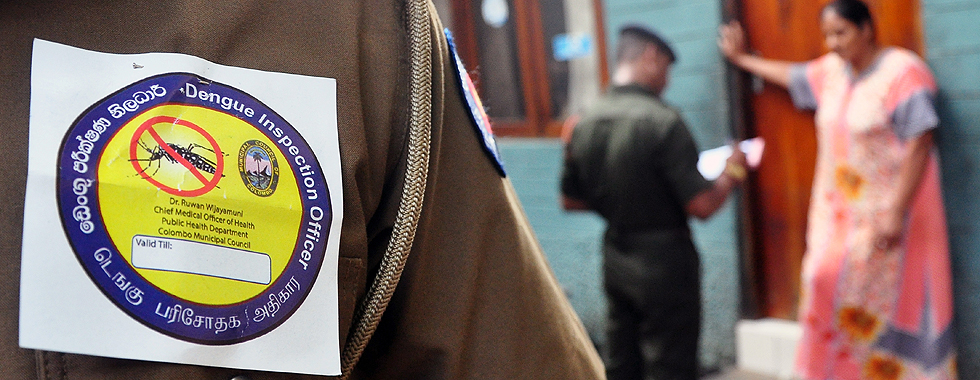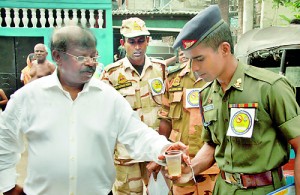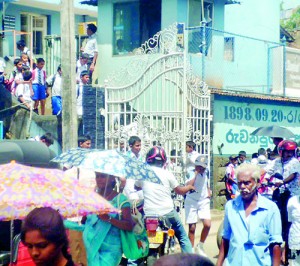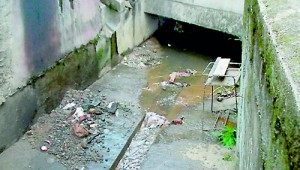News
Tourists will shy away from dengue land, official warns
Dengue fever, which has claimed 50 lives and made 17,000 people ill, will put the country’s lucrative tourism sector in danger if the current outbreak continues, a top health official warned.
Colombo Municipal Council (CMC)’s Chief Medical Officer Dr. Ruwan Wijeyamuni said peaks of dengue outbreaks are experienced in June and July and a lack of preventive measures will drive tourists away.

Dengue inspectors doing their rounds in Colombo city, one of the tourist areas declared as high risk. Pic by Amila Gamage
The United States has warned its citizens travelling or living here that dengue fever continues to pose risks. American citizens were advised to take precautions against being bitten by mosquitoes since there were no vaccines or specific treatment for dengue.
“Dengue fever may be fatal if left untreated and often impacts children more adversely” the warning said.
The Australian government, in its travel advisory to Sri Lanka, stated that “all regions of Sri Lanka experience outbreaks of the mosquito-borne dengue fever”.
The United Kingdom too in its travel advisory to the country refers to the dengue cases reported last year: “In 2013 there were 31,825 reported cases of suspected dengue fever, a common viral infection spread by mosquitoes”.
Even the Sri Lanka Tourism Development Authority requests those travelling to the country to watch out for vector borne diseases such as malaria and dengue fever.
June recorded the highest number of cases for the year with 4,500 cases reported in the first few weeks of the month, bringing the total to 17,000. Colombo district led with 6,174 cases followed by Gampaha and Ratnapura.
Among the tourist areas declared as high risk are Colombo city, Dehiwela-Mount Lavinia, Negombo and the Kalutara, Galle, Matara, Ratnapura, Trincomalee and Batticoloa districts.

Dengue monsquito larvae found in this area being inspected. Pic by Indika Handuwala
Dr. Wijeyamuni told the Sunday Times that entomological research has revealed that increased atmosphere temperature results in the Aedes mosquito requiring more energy in order to breed – thus being more voracious in its feeding – and that the virus thrives in warm temperatures of more than about 28-30 C or more.
“Unlike the human body, the mosquito’s body and larvae change according to the temperature. Mosquitoes will need frequent feeding due to energy requirments. This results in increased blood meals. Scattered rains coupled with high temperature will lead to increased mosquito breeding and mosquito bites,” he said.
He said all hospitals, both private and state, have been instructed to keep dengue patients under bed nets in order to prevent other patients, visitors and medical staff from contracting dengue. Hospital managers have been instructed to keep hospitals free of mosquito breeding.
“At present, hospitals are flooded with both dengue suspects and confirmed cases. There are also many cases of rotavirus cases, a virus that has similar symptoms such as fever, headache, vomiting and diarrhoea. Therefore hospital authorities should be extremely vigilant,” he said.
Dr. Wijeyamuni said patients should seek immediate medical attention after just two days of a fever.
In order to prevent a worse outbreak, a city-wide cleaning and inspection programme is to take place from July 3- 9, with 53,000 premises to come under inspection, including private, state and international schools, government institutions and residences.
A workforce of about 2,000 personnel attached to the national Dengue Task Force will be involved in the week-long campaign.
“As we have taken the Railways Department to court many times, and yet commuters continue to throw discarded containers along the rail track and railway yards are not maintained properly allowing mosquito breeding and overgrown vegetation, a cleaning campaign will be held on July 5 from the Fort to Dematagoda railway track with the participation of military personnel,” he said.
| Tombs are breeding groundsTombstones in cemeteries have been declared one of the major mosquito breeding spots in this year’s outbreak.
“There have been a number of dengue fever cases in surrounding areas where a cemetery is located, especially when there are burial structures in which rainwater can stagnate,” said the Public Health Inspectors Union Secretary, Mr Senarath Bandara. “Inspecting each and every tomb is an impossible task,” he said. Mr. Bandara said all PHIs had been requested to instruct local authorities to conduct cleaning in cemeteries and if possible to make small apertures in hollow burial structures for water to drain out,” he said. He said plans of tomb structures that do not hold rainwater are being designed and will be handed over to local authorities.
Ratnapura disease surge prompts warning The Epidemiology Unit also requests the public not only to inspect discarded containers but also natural breeding places such as overgrown vegetation and plants such as bamboo, bohemia, rampe (pandan leaves) and banana as well as places such as mining pits. The warning comes following the sudden increase of cases in Ratnapura district, which reported only 52 cases in January but had 686 cases during the first four weeks of June.  One of the many schools that were closed in Ratnapura for fear of the spread of dengue, reopens. Pic by Lasantha Niroshana  The state of a drain close to the school |

